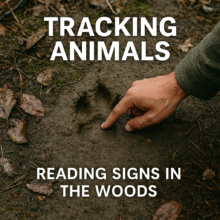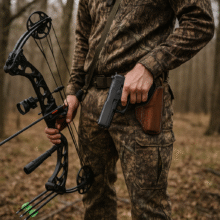Elevating Your Game: The Path to Becoming a Better Hunter

Table of Contents
- Introduction
- 1. Continuous Learning and Skill Development
- 2. Understanding Your Quarry
- 3. Ethical Hunting Practices
- 4. Environmental Stewardship
- 5. Physical and Mental Preparation
- 6. Networking and Mentorship
- 7. Advanced Scouting Techniques
- 8. Embracing Silence and Stillness
- 9. Nurturing a Conservationist’s Mindset
- 10. Enhancing Mental Toughness and Patience
- 11. Commitment to Continuous Improvement
- Conclusion
- Frequently Asked Questions (FAQs)
Introduction
The journey to becoming a better hunter is as much about personal growth as it is about skill enhancement. It involves a commitment to learning, ethical hunting practices, and a deep respect for the natural world. This guide outlines key areas where you can focus your efforts to not only improve your hunting skills but also enrich your overall hunting experience.
1. Continuous Learning and Skill Development
1.1 Master Your Equipment
- Practice Regularly: Spend time familiarizing yourself with your hunting gear. Regular practice with your chosen weapon, be it a rifle, bow, or another, ensures proficiency and confidence in the field.
1.2 Stay Informed
- Educate Yourself: Keep up to date with the latest hunting techniques, regulations, and conservation news. Attend workshops, seminars, and hunter education courses to expand your knowledge.
2. Understanding Your Quarry
2.1 Study Animal Behavior
- Learn Patterns: A deep understanding of the animals you hunt, including their habits, feeding patterns, and seasonal movements, can dramatically increase your success rates.
2.2 Track and Sign Reading
- Sharpen Your Tracking Skills: Learn to identify and interpret animal tracks, trails, and signs. Tracking skills not only help in locating game but also in understanding animal behavior.
3. Ethical Hunting Practices
3.1 Know and Respect the Laws
- Follow Regulations: Adherence to hunting laws and regulations is fundamental. They are in place to ensure sustainable wildlife populations and ethical hunting practices.
3.2 Aim for a Quick, Humane Harvest
- Ethical Shot Placement: Strive for clean, ethical shots that ensure a quick and humane harvest. This respects the animal and minimizes suffering.
4. Environmental Stewardship
4.1 Practice Leave No Trace
- Minimize Impact: Take all necessary steps to minimize your impact on the natural environment. This includes packing out what you bring in and leaving habitats undisturbed.
4.2 Participate in Conservation
- Give Back: Engage in wildlife and habitat conservation efforts. This can range from participating in habitat restoration projects to supporting wildlife management initiatives.
5. Physical and Mental Preparation
5.1 Stay in Good Physical Shape
- Physical Fitness: Hunting often requires stamina and strength. Regular exercise and conditioning can prepare your body for the physical demands of hunting.
5.2 Mental Resilience
- Cultivate Patience and Persistence: Mental toughness is as crucial as physical readiness. Hunting can test your patience and resilience, qualities that are essential for success.
6. Networking and Mentorship
6.1 Learn from Experienced Hunters
- Seek Guidance: Don’t hesitate to seek advice from more experienced hunters. Mentorship can be a valuable source of practical knowledge and insights.
- Contribute to the Community: Sharing your experiences, successes, and failures can help others learn while strengthening your understanding and appreciation of hunting.
7. Advanced Scouting Techniques
7.1 Utilize Technology Wisely
- Digital Scouting: Leverage satellite imagery and mapping software to pre-scout areas. Apps that track weather patterns and wind direction can also be crucial in planning your hunt.
7.2 Field Scouting
- Boots on the Ground: There’s no substitute for physically scouting your hunting area. Time spent in the field not only helps you understand the terrain but also connects you deeply with the natural environment you’re operating in.
8. Embracing Silence and Stillness
8.1 The Art of Being Unseen
- Camouflage Beyond Clothing: True camouflage involves managing noise levels and minimizing movements. Practice moving silently and remaining motionless for extended periods to blend into your surroundings.
8.2 Mindfulness in the Wild
- Presence and Awareness: Develop mindfulness practices that enhance your awareness and presence in the natural world. This can improve your ability to detect wildlife and make ethical decisions in the moment.
9. Nurturing a Conservationist’s Mindset
9.1 Educate Yourself on Local Ecosystems
- Beyond the Hunt: Gain a broad understanding of the ecosystems where you hunt. Knowledge of native plant species, wildlife habitats, and ecological challenges enriches your experience and fosters a deeper respect for nature.
9.2 Active Participation in Conservation
- Volunteer and Advocate: Actively participate in conservation efforts, whether through volunteer work with local wildlife agencies or advocacy for policies that support sustainable hunting and biodiversity.
10. Enhancing Mental Toughness and Patience
10.1 Building Resilience
- Embrace Challenges: View difficult hunting experiences as opportunities for growth. Building resilience comes from facing and overcoming the challenges inherent in hunting.
10.2 Cultivating Patience
- A Hunter’s Virtue: Patience is a critical skill in hunting. Develop practices that enhance your ability to wait, observe, and act judiciously, recognizing that some of the best hunting outcomes come from waiting for the right moment.
11. Commitment to Continuous Improvement
11.1 Self-Reflection and Learning
- Journaling and Review: Keep a hunting journal to reflect on each hunting trip. Note what worked, what didn’t, and how you can improve. This self-reflection is invaluable for continuous growth.
11.2 Seeking Feedback and Education
- Lifelong Learning: Remain open to feedback from peers and mentors. Attend advanced hunting courses, seminars, and workshops to stay updated on best practices and innovations in hunting techniques and conservation.
Conclusion
Becoming a better hunter is a lifelong journey of improvement, respect, and stewardship. By dedicating yourself to learning, ethical practices, and contributing positively to the environment and hunting community, you enhance not only your own hunting experience but also the broader tradition of hunting. Embrace the process, and let each hunting adventure teach you something new.
Frequently Asked Questions (FAQs)
How can I improve my accuracy for hunting?
- Regular, focused practice under varied conditions can improve accuracy. Also, consider professional coaching to refine your technique.
What’s the best way to learn animal behavior?
- Spend time in the field observing wildlife. Reading scientific literature on animal behavior and watching documentaries can also provide valuable insights.
How important is camouflage in hunting?
- Camouflage can be crucial in not being detected by game. It’s important to choose patterns that match the environment you’ll be hunting in.
Can technology make me a better hunter?
- Technology, when used appropriately, can enhance your hunting experience. GPS devices, ballistic calculators, and trail cameras can provide useful information and improve your chances of success. However, technology should complement, not replace, fundamental hunting skills and knowledge.







